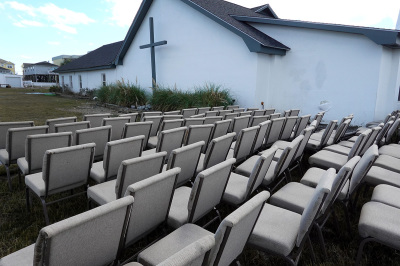Escaping the whales: Churches and socio-political movements

Like great humpback whales that scoop whole schools of fish into their mouth with one gulp, so socio-political movements of the right and left in our day threaten to swallow churches whole. Churches are delectable prey because churchgoers are motivated to serve humanity, their countries, and their communities. Many too readily fall into the deep gullets of the beasts that pursue them.
This is nothing new. In the 1960s, as a daily newspaper journalist, I covered many religious groups and their leaders. The movements then were for civil rights, reparations, the end of American involvement in Vietnam, and much more.
I recall especially a meeting of the Bishops of the American branch of the Anglican (Episcopal) church at the University of Notre Dame. I interviewed controversial California Bishop James Pike, who had gone as far as to join an occultic movement hoping to find a way to communicate with his deceased son. Much of the Episcopal Church in the United States went down the ample throats of the leftist movements of that day. In England, the Anglicans were being devoured as well. Thankfully African and Asian Anglican clergy held tight to healthy theology, and scholars like N.T. Wright was spared to keep Anglicanism from being totally consumed in the eating frenzy of the whalelike movements in their society.
Decades ago, I was present at the meeting in St. Louis of the groups that would come together to form the United Methodist Church. That meeting, too, was in the sights of leftist movements who wanted to engulf the new Methodism and feed off its succulence.
On the American West Coast, there were movements aimed at pulling churches into a trendy, cool mode that would tease the human psyche by focusing on a heavily immanent expression, pushing aside the idea of God’s transcendence.
The seeker movement of that period grew rapidly. It brought many new folks into churches but also was sometimes distorted into making the Gospel all about happiness, health, and wealth.
In the Deep South in the 1960s-70s, there were movements from the right that wanted to preserve racism and segregation. Meanwhile, in the north, great schools linked themselves to neo-Orthodox movements. Eventually, that theologically left trend would collide with the inerrancy movements in evangelical groups.
What’s the answer to all this? Here are some things I learned through covering the raging movements in a period similar to the present:
- Remember there is nothing new under the sun. I am 80 years old, and so the movements I have just described all arose more than a half-century ago. Most are forgotten except in university sociology classes. The Kingdom of God is the only movement worthy of us giving our lives and churches to.
- Thus, movements come and go. Rather than becoming prey for the “great whales” our focus should be on using our energies to build churches that are Jesus-centered, Spirit-energized, Word-anchored, Kingdom-proclaiming, disciple-making, and servant-hearted. Churches built on the Solid Rock will not be “tossed about” in the surges that come and go (Ephesians 4).
- Remember that the real Church is to build people, not political organizations. In that regard, every church should be a center of worldview studies, based on scriptural truth and values. That will equip people to go into the frothing waters where the whales thrash.
Professor Findlay Edge, midst the 1960s movements described their cycles. A movement begins with a freshness and new dedication to alter the status quo. The movement’s initial growth is strong because people want to embrace new hope and fresh solutions. The status quo is threatened by the movement and pushes back, but the movement grows even more because people view it as a heroic venture that will save society. The status quo is so threatened that it begins serious punishment of those in the movement, like loss of jobs, reputation, and ultimately even lives. When things get that serious, people in the movement get weary of being thrown to the lions, and discussion begins with the leadership of the status quo about how they can stay out of the lion’s den. Compromise follows. Now the movement becomes institutionalized like others, and the survival of the new institution becomes more important than the truth and cause that gave it birth.
The real Church in our confusing era is not to become a rigid institution, nor to join the movements that urge it to come in and embrace its worldview, goals, and strategies.
Churches should be involved in the political process, but organically, not institutionally. This happens as churches equip their people with a biblical worldview as the point of reference for their personal engagement with socio-political issues. Their mission should be that of being the “salt” that takes the Gospel of Christ’s Kingdom into the socio-political sphere.
The Apostle Paul knew a lot about politics and movements, and stated the mandate for the Church clearly in Ephesians 4:11-12:
“He (Christ) gave some as apostles, and some as prophets, and some as evangelists, and some as pastors and teachers, for the equipping of the saints for the work of service, to the building up of the body of Christ…”
Rome and its many movements are long gone, but the Church still stands.
Wallace B. Henley is a former pastor, daily newspaper editor, White House and Congressional aide. He served 18 years as a teaching pastor at Houston's Second Baptist Church. Henley is author or co-author of more than 25 books, including God and Churchill, co-authored with Sir Winston Churchill's great grandson, Jonathan Sandys. Henley's latest book is Who will rule the coming 'gods'? The looming spiritual crisis of artificial intelligence.



























